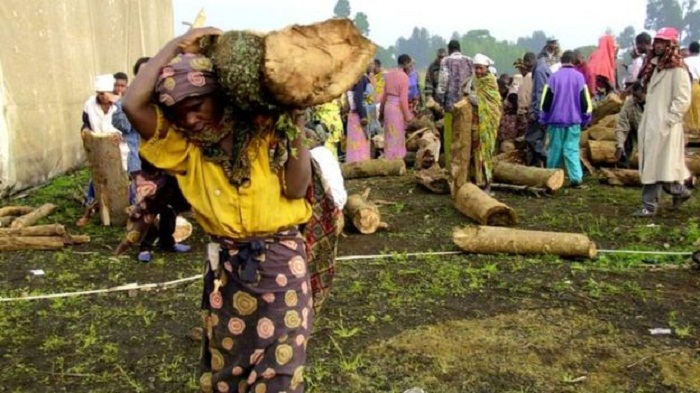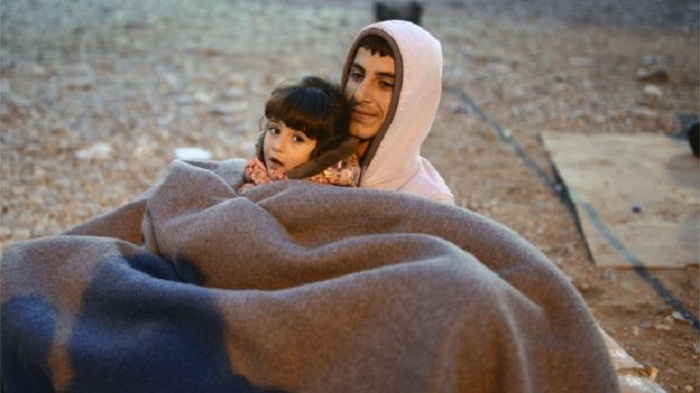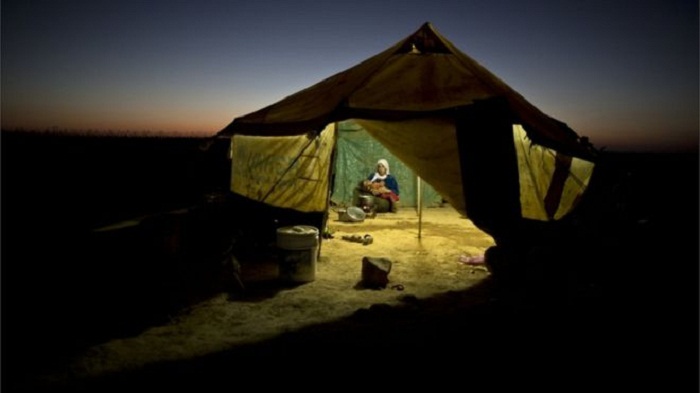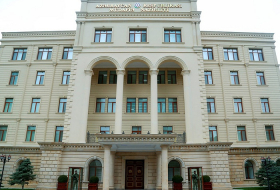The use of alternatives, such as improved cookstoves and solar lamps, could save money and lives, they added.
The findings, produced by UK think-tank Chatham House, were published as part of the Moving Energy Initiative.
The initiative is an international consortium of organisations looking for sustainable - secure, safe and affordable - ways to meet the energy needs of the estimate 60 million people who have been forcibly displaced from their homes.
Most of the nine million refugees who have been forced to flee their homes and live in camps face horrendous energy poverty, the report concludes.
"We think now is an important time to look at this issue because of the crisis of displacement and the crisis of migration that we are seeing across the world," explained co-author Glada Lahn, a senior research fellow at Chatham House.
"We have numbers edging towards 60m people, and it is rising. This is greater than the populations of Australia and Canada put together."
 ""
""Against the backdrop of the rising number of displaced people around the world, Ms Lahn told BBC News that funding was falling.
"There is a real crisis in terms of keeping up and how to make sure that these people, who are often in very vulnerable situations, are protected and are able to maintain some kind of human dignity," she said.
The report highlighted that energy use among displaced people was economically, environmentally and socially unsustainable, with women and children bearing the greatest cost.
Ms Lahn said their research suggested that about 90% of people living refugee camps had no access to electricity.
"Many of them live in the dark at night because there is very little street lighting. There is a huge dependence on wood-based fuels, such as charcoal, for cooking. About 77% of energy use came from wood and charcoal," she observed.
"Reliance on these fuels disproportionately affects women and girls. This is because it is almost always women and girls that go outside of the camps to collect firewood. There are so many instances of attacks and rape."
 ""
""The problem of no or inadequate access to energy sources was part of a much greater problem worldwide, she added.
"There are about 2.9bn people in the world living with very inadequate access to energy. Displaced people are part of this group but it tends to be a grey area.
"They tend to fall under the humanitarian umbrella, which tends to have quite a short outlook in terms of funding and budgets. It also tends to be politically constrained because host countries do not want to see long-term planning where shelters are made more efficient or infrastructure is introduced."
Despite their temporary appearance, there are examples of refugee camps in various parts of the world that have been there for decades yet the power infrastructure remained temporary or non-existent.
"People want to bring up their kids to study, to start businesses yet the lack of energy is a disabler," Ms Lahn said.
The report highlighted a number of solutions, including a number of logistically straightforward quick fixes.
It suggested that the widespread introduction of basic improvements, such as cooking stoves and solar lamps, could generate savings of about US $323m (£213m) a year in fuel costs.
It also recognised that a number of private sector companies had developed green energy systems, such as solar mini-grids, that were appropriate for low-income communities.
Such solutions for refugee camps could be shared with host nations in an effort to improve energy access and energy security for the area`s wider population, it added.
Amazing advances
Ms Lahn observed that this approach to meeting people`s energy needs would not only help tackle health and security concerns, it would also help lift people out of extreme poverty and reduce the environmental cost of using wood fuels, such as deforestation and emissions.
UK International Development Minister Grant Shapps, whose department supports the Moving Energy Initiative, said:
"Across sub-Saharan Africa, hundreds of millions of people still do not have access to electricity. Women and girls are at risk of violence after dark, families are forced to inhale toxic kerosene fumes, and energy remains unaffordable for many," he said.
"With the technology in place and investors coming on board, the time to act is now.
"Supporting the Moving Energy Initiative is another way Britain can help boost access to clean, reliable and affordable energy. This will transform people`s lives and help achieve the UN`s goal of universal energy access by 2030."
In his foreword to the report, former UN Secretary-General Kofi Annan recognised the role that the private sector could play in meeting the energy challenge facing the world`s growing population of displaced people.
"Entrepreneurship and amazing advances in technology are not being used systematically to respond to the needs of uprooted people or the communities that host them," he wrote.
"Getting this right could yield significant benefits for humanitarian organisations, host authorities and governments and, above all, for the livelihoods and dignity of the forcibly displaced."
In order to unlock this potential solution, Ms Lahn suggested that the issue needed to be placed higher up the list of priorities within the humanitarian sector.
"Energy is not yet one of the core considerations in the humanitarian system. You have focuses on water, shelter, protection etc. Many of these things rely on energy but energy itself is not one one of the core considerations so it tends not to be a focus for procurement or long-term planning," she said.
"Budgets often tend to be over a 12-month period so there is no capacity for making a large, upfront investment for things such as solar equipment or insulation.
"Therefore, it means that they are unable to access the relatively short pay-off periods that the technologies offer.
"Funding and budgeting are big challenges to overcome. It would really help organisations to have a central fund that they could access."
More about:
















































